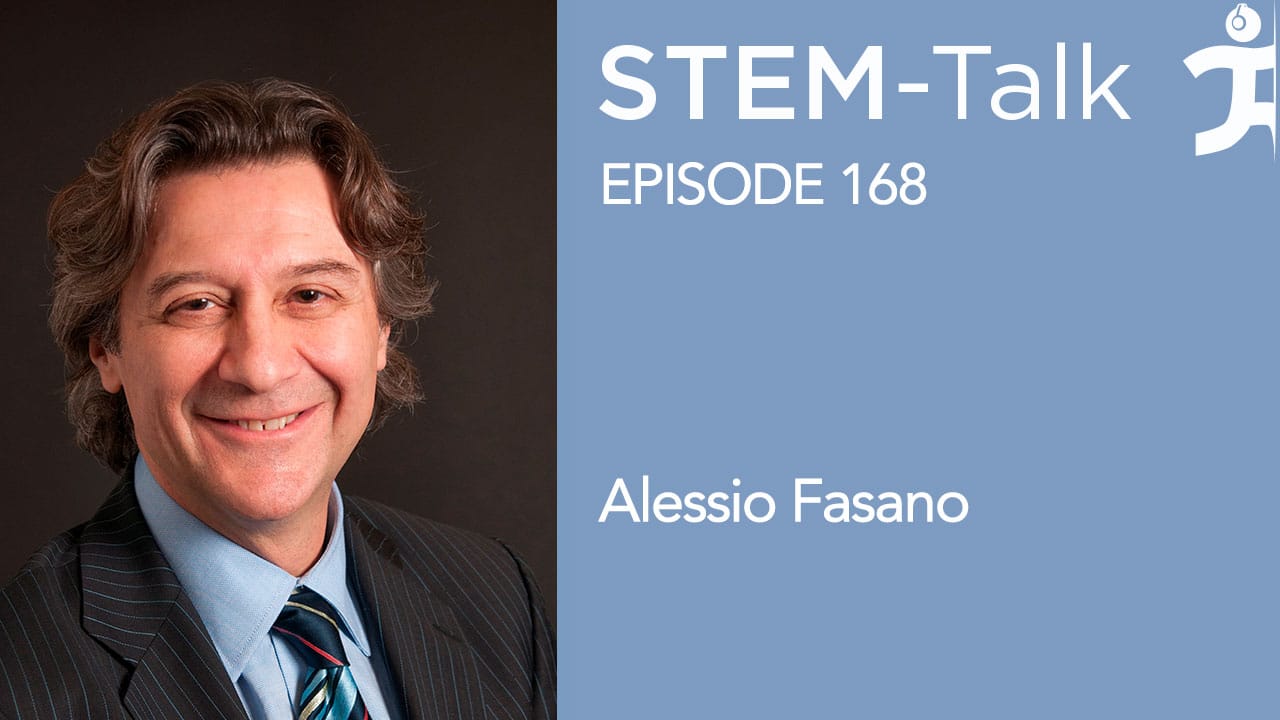STEM-Talk
Episode 168: Alessio Fasano discusses celiac disease and gluten-related disorders
// May 22, 2024

Dr. Alessio Fasano, who is considered the world’s leading expert in celiac disease and gluten-related disorders, returns for his second appearance on STEM-Talk. Although just 2 million Americans have celiac disease, an estimated 20 million Americans suffer from gluten sensitivity.
Alessio is a professor and director of the Mucosal Immunology and Biology Research Center at Massachusetts General Hospital. In addition to celiac disease and gluten-related disorders, Alessio’s research is also focused on the microbiome, intestinal permeability and autoimmune disorders, which he discussed in his first interview on STEM-Talk, episode 20.
Since Alessio’s first appearance on STEM-Talk in 2016, he has published two books, “Gluten Freedom” and “Gut Feelings: The Microbiome and Our Health,” which we discuss in today’s interview. We also talk to Alessio about an exciting new project that’s bringing together an international consortium of researchers and scientists for a long-term study that will follow infants who are genetically at risk of developing celiac.
Alessio is a researcher and physician who wears many hats. He is the director of the Center for Celiac Research and Treatment and chief of the Division of Pediatric Gastroenterology and Nutrition at Mass General Hospital. He also is a professor of pediatrics at Harvard Medical School and a professor of nutrition at Harvard’s T.H. Chan School of Public Health.
Show notes:
[00:03:58] Marcas opens the interview welcoming Alessio back to STEM-Talk, mentioning that since his last appearance he has written two books: Gluten Freedom and Gut Feelings: The Microbiome and Our Health. Marcas asks Alessio how he became interested in pediatrics and gastroenterology. [00:05:42] Ken mentions that Alessio moved to the U.S. in the 1990s and spent 20 years in Maryland at the Center for Vaccine Development in Baltimore. Ken goes on to mention that while Alessio was there, he founded The Center for Celiac Research in 1996, and in 2003, Alessio accepted an offer to join Massachusetts General Hospital. Ken asks how that move came about. [00:08:53] Marcas asks about Alessio’s early career working on cholera, where he discovered the zonula occuldens toxin, the bacteria that causes cholera. Marcas asks Alessio to talk about this finding and the insights he gleaned from it. [00:16:03] Ken asks about Alessio’s discovery of zonulin, which is the molecule that modulates gut permeability in humans. Ken asks Alessio to share how this discovery led him to investigate celiac disease, which is triggered by gluten. [00:20:25] Ken asks Alessio what his thoughts are on why the medical community, historically, has not taken celiac disease seriously. [00:24:08] Marcas mentions that as we age, there is evidence that the gut becomes leakier, which is highly related to chronic inflammation. Marcas asks Alessio whether this happens to the gut over time due to diet and lifestyle rather than the typical aging process. [00:28:45] Ken mentions that there has been an increase in the diagnosis of celiac disease. Ken asks Alessio if that is due to an actual increase in the prevalence of the disease, or is it tied to a growing appreciation that clinicians have now for the disease? [00:29:32] Marcas mentions that Alessio’s book, Gluten Freedom, which he co-authored with his colleague Susie Flaherty, was referred to by the Celiac Disease Foundation as “a must have,” and “an excellent reference for those with gluten related disorders.” Marcas asks Alessio about this reception to his book. [00:31:24] Marcas mentions that the only viable treatment for individuals with celiac disease has been a gluten-free diet, with pharmaceutical companies having had little interest until recently in investigating the disease. Now there are more than 20 drug therapies in development for celiac. Marcas asks Alessio about the progress being made to develop pharmacological interventions for celiac. [00:34:17] Ken mentions that gluten sensitivity affects more than 20 million Americans. This sensitivity is when a person reacts negatively to the gluten protein but does not test positive for celiac. Ken mentions that this condition is often underappreciated by physicians and asks Alessio to discuss gluten sensitivity and its impact. [00:40:41] Marcas points out that celiac disease is a disorder with genetic components. A group of genes called HLADQ and DQI genes are involved in the development of the disease. About a third of the population inherits these genes, but not everyone who possesses them will develop celiac. Marcas asks Alessio to elaborate on this phenomenon. [00:42:51] Marcas asks Alessio to talk briefly about his book Gluten Freedom. [00:43:40] Ken asks about the experience Alessio had working with Bob Prior at MIT Press, the publisher of Gluten Freedom. [00:47:07] Ken mentions that Alessio has expressed in the past that he does not like the term “leaky gut,” which can be offered as a diagnosis, and asks Alessio why that is. [00:49:38] Ken mentions Alessio gave a talk in 2018 at the Institute for Functional Medicine’s annual conference titled: “Autoimmunity and the Interplay of Genes and the Environment.” Ken explains that this talk began by pointing out that medicine is still largely ignorant of certain aspects of human biology, and how and why people get sick. Ken asks Alessio to discuss the main points of this talk. [00:52:21] Ken mentions that in researching “Gluten Freedon” that Alessio consulted with Claire Fraser who was our guest on episode 32. Ken asks Alessio how he met Claire. [00:55:28] Marcas pivots to talk about Alessio’s current work, namely his recent project “The Celiac Disease Genomic Environmental Microbiome and Metabolomics Study.” Marcas goes on to explain that this project will follow infants from birth through childhood in an effort to better understand the many factors that contribute to the development of celiac. [01:06:12] Ken mentions that for this study, Alessio recruited not only American families but also participants from Spain and Italy, asking what the rationale was for those populations. [01:07:14] Marcas asks if the overarching goal of this study is to pave the way for personalized prevention of celiac disease. [01:08:37] Marcas asks about a paper Alessio published in the American Journal of Gastroenterology titled: “Early Antibody Dynamics in a Prospective Cohort of Children At-Risk for Celiac Disease,” which aimed to identify possible serum biomarkers that could help predict celiac disease in at-risk children. Marcas asks Alessio to talk about the design of this study and its findings. [01:10:14] Ken pivots to talk about a study Alessio published earlier this year in the Journal Pediatrics on zonulin. Ken explains that this study evolved from the observation that increased intestinal permeability appears to be a key factor in several autoimmune diseases including celiac. However, the question remains whether increased permeability of the intestines precedes disease onset or if it is a consequence of disease onset. Ken asks Alessio to touch on this study and its findings. [01:11:41] Marcas mentions that as a pediatric gastroenterologist, Alessio also works with children on the autism spectrum, who in addition to social challenges and repetitive behaviors deal with a variety of symptoms. Marcas asks Alessio to talk about his experience working with these children. [01:16:27] Ken mentions that when we last had Alessio on STEM-Talk, he was in the middle of renovating a 13th century monastery into the European Biomedical Research Institute of Salerno. Ken asks Alessio to give an update on this project. [01:19:54] Marcas mentions that Alessio’s son, Stefan, has joined IHMC as a research associate. Marcas asks Alessio how Stefan is liking it here at IHMC. [01:22:56] Marcas ends the interview asking Alessio if he will write another book.Links:






